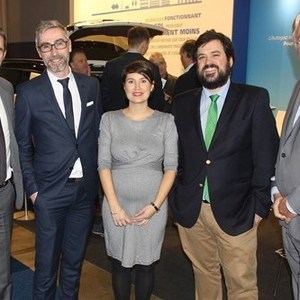ePURE to EU: Don't abandon existing biofuels

PHOTO: ePURE
January 15, 2020
BY ePURE
The EU’s long-term energy transition goals depend not just on developing new technologies but also on alternative-fuel solutions that already reduce harmful emissions. As the EU reframes important environment and energy legislation under the European Green Deal, it should not abandon clean, proven and cost-effective solutions such as sustainable renewable fuels and LPG.
That’s the message from a broad coalition of vehicle manufacturers and alternative-fuel producers and suppliers who, in a new joint declaration, call on the European Commission to take a technology-neutral approach in its upcoming review of the Alternative Fuels Infrastructure Directive. The coalition includes ACEA (the European Automobile Manufacturers’ Association), Liquid Gas Europe, ePURE (the European renewable ethanol association), EBB (the European Biodiesel Board) and UPEI (representing European independent fuel suppliers).
“It is imperative that all alternative fuels play a role in the energy transition,” the coalition said today. “While it is important to set long-term objectives, Europe should not dismiss solutions that are already available, cost-effective, commercially viable and that positively contribute to the energy transition.”
Advertisement
The group urges the Commission to maintain its current definition of alternative fuels in the upcoming review of the Alternative Fuels Infrastructure Directive, guaranteeing consistent policymaking and a stable investment environment. The Directive is intended to build the market for alternative fuels, such as Autogas (LPG as transport fuel) and sustainable renewable fuels (such as ethanol, biodiesel and biogas), which have already reached a certain degree of maturity, and to jump-start a market for newcomers, such as electromobility and hydrogen.
Currently, alternative-fueled vehicles represent a small but growing percentage of the EU fleet. Meanwhile road transport GHG emissions continue to rise, and many countries are in breach of air quality standards. That means the EU will need to do a better job of mobilizing solutions that work today in addition to supporting the market development for new technologies and related infrastructure.
Advertisement
Given the urgency of the climate and air quality crisis, the EU needs to take a practical approach. This includes promoting cleaner-burning fuels that are already commercially viable and competitively priced, that deliver immediate benefits, and that do not require drastic and costly changes to infrastructure or powertrain technologies.
Read the full declaration here.
Related Stories
President Trump on July 4 signed the “One Big Beautiful Bill Act.” The legislation extends and updates the 45Z credit and revives a tax credit benefiting small biodiesel producers but repeals several other bioenergy-related tax incentives.
CARB on June 27 announced amendments to the state’s LCFS regulations will take effect beginning on July 1. The amended regulations were approved by the agency in November 2024, but implementation was delayed due to regulatory clarity issues.
SAF Magazine and the Commercial Aviation Alternative Fuels Initiative announced the preliminary agenda for the North American SAF Conference and Expo, being held Sept. 22-24 at the Minneapolis Convention Center in Minneapolis, Minnesota.
Saipem has been awarded an EPC contract by Enilive for the expansion of the company’s biorefinery in Porto Marghera, near Venice. The project will boost total nameplate capacity and enable the production of SAF.
Global digital shipbuilder Incat Crowther announced on June 11 the company has been commissioned by Los Angeles operator Catalina Express to design a new low-emission, renewable diesel-powered passenger ferry.
Upcoming Events










